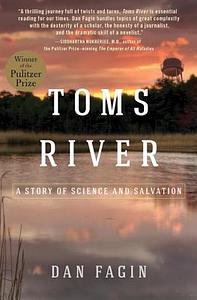Take a photo of a barcode or cover
Dan Fagin tells the story of Toms River, a New Jersey community that was home to some significant chemical production plants at a time when the understanding of what the waste products were and what they could do to the environment and people was far from understood. Add to this the lack of regulation, oversight, and the power of profit, then things do not go well. Fagin does a really good job of taking the reader through the complex world of chemical creation and production as well as the corporate giants that arose from it. He also manages to relay the complex science not just behind the chemicals themselves but behind the development of regulation and ultimately how hard it can be to prove causation and not just correlation. I liked how he interspersed the history of the chemical industry involved throughout the Toms River story, making those connections and links clearer and easier to follow (I'll be honest, I wasn't a fan at first but then I started seeing the benefit). This is a really hard and heavy book for many reasons, obviously the human side is devastating and the outcome not as satisfying as it would be in fiction (as a Welsh person, the damage done by external industry is an all too familiar story), but also the science side, which Fagin covers in as much detail to show how hard those involved worked to try and get some form of closure. But science doesn't bend to emotion and doesn't always give the answers that those driving it wants (or the data doesn't, those writing it might do the bending instead). This was a really educational and great read, I can't say I enjoyed it but I'm glad I read it. It is an important book, not just for Toms River and other New Jersey communities but all those places that have and are subject to industry, my home area of South Wales included.
With the water situation in Detroit, this book is so relevant. Tom's River, a seaside town in New Jersey, became the dumping ground for the local manufacturing plants. Over the course of several decades, the land and the water became so polluted the local residents and children started becoming sick. What followed was decades of testing and litigation. What resulted was the largest environmental settlements of all time.
I loved that the author took us on a 60 year journey giving us all the moving parts. Yes, it's a lengthy, book that gets quite technical in places, but every page is filled with meaning. The only reason I didn't give it five stars is that I felt the book was in need of a good editor. There were some parts of the book that detracted from the overall feel by going off on an unnecessary tangent. But overall, the book was so engaging that I would highly recommend it to anyone.
I loved that the author took us on a 60 year journey giving us all the moving parts. Yes, it's a lengthy, book that gets quite technical in places, but every page is filled with meaning. The only reason I didn't give it five stars is that I felt the book was in need of a good editor. There were some parts of the book that detracted from the overall feel by going off on an unnecessary tangent. But overall, the book was so engaging that I would highly recommend it to anyone.
informative
sad
slow-paced
FIRST LINE REVIEW: "On the rare occasions when Michael Gillick needed to know what day it was, he would check his pillbox." Michael is one of the most prominent of the Toms River cancer children, victims of chemical dumping (maybe?) that launches this fascinating journey into investigative reporting. Toms River is only an hour away from me. I've driven through on the way to the shore and never knew about its troubling past. I learned so much about epidemiology, cancer studies, industrial health, and just how difficult it is to prove that toxic dumping is linked to health issues. Very difficult! Fagin takes us on a journey from the 1950s to the present day, with many flashbacks into the past world of research and discovery, from the 1550s-the 1900s. Good stuff!
dark
informative
mysterious
reflective
sad
tense
medium-paced
informative
sad
slow-paced
Very interesting account of a corporation dumping/polluting a town, with the complicity of politicians and even the townspeople. But when kids start getting cancer at alarming rates, it's another story.
What fascinated me about this tale was the sheer difficulty of proving a causal relationship. We came to see the Erin Brockovich story as something which is just a matter of gathering the data, putting it together, and then showing it to the world. But it is much for difficult than that, as Fagin makes clear. Also interesting was Jan Schlachtmann's involvement, he of A Civil Action fame.
I knocked this down a star because I felt that Fagin provided too much science, too many details. I love this stuff, but at the end even my eyes were glazing over and I started to skim. It became less of a riveting tale about people and more a medical journal article. I think he could have synthesized in a better way.
Nevertheless, it is still a valuable read.
What fascinated me about this tale was the sheer difficulty of proving a causal relationship. We came to see the Erin Brockovich story as something which is just a matter of gathering the data, putting it together, and then showing it to the world. But it is much for difficult than that, as Fagin makes clear. Also interesting was Jan Schlachtmann's involvement, he of A Civil Action fame.
I knocked this down a star because I felt that Fagin provided too much science, too many details. I love this stuff, but at the end even my eyes were glazing over and I started to skim. It became less of a riveting tale about people and more a medical journal article. I think he could have synthesized in a better way.
Nevertheless, it is still a valuable read.
challenging
dark
emotional
informative
sad
tense
medium-paced
dark
informative
reflective
sad
medium-paced
dark
informative
reflective
medium-paced



